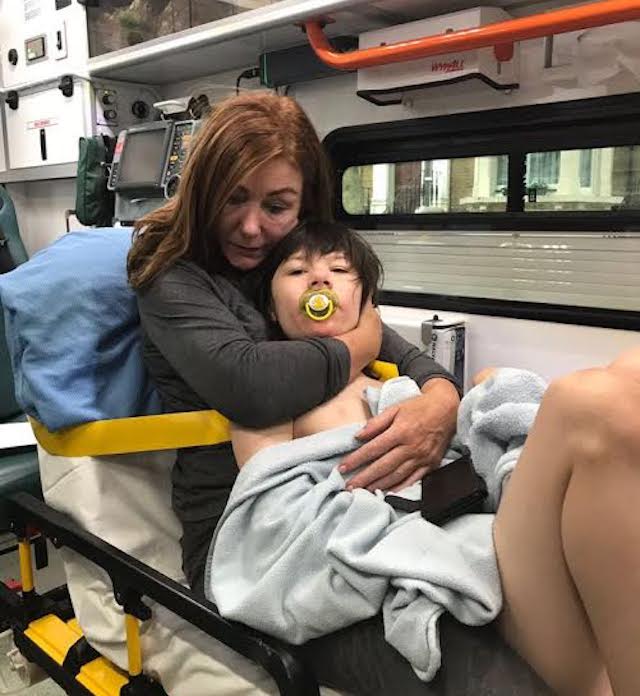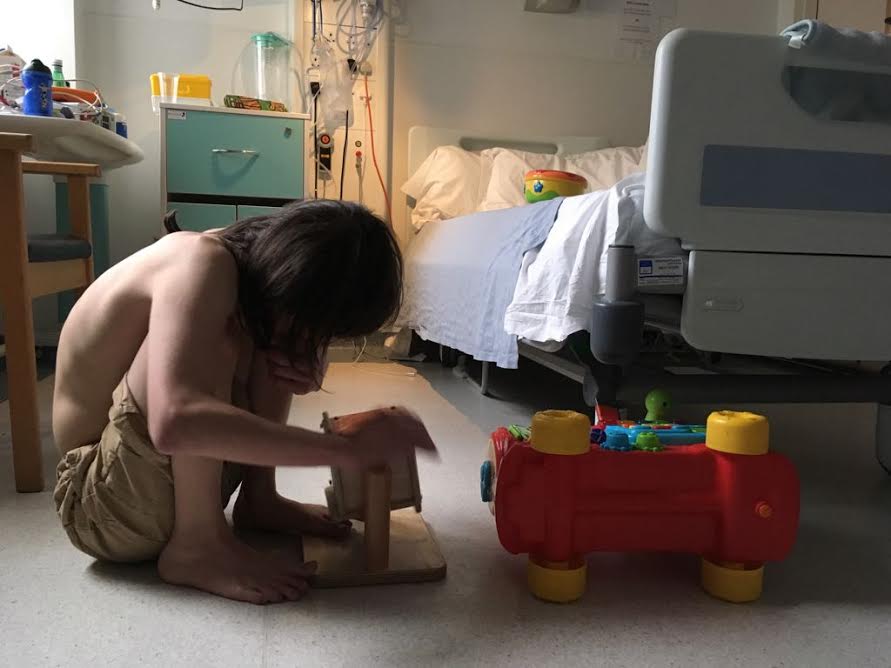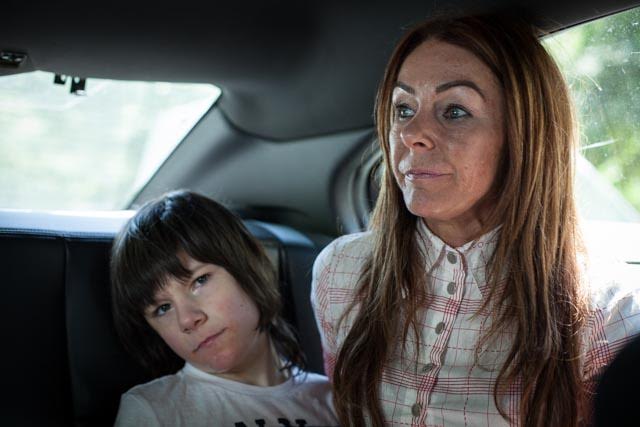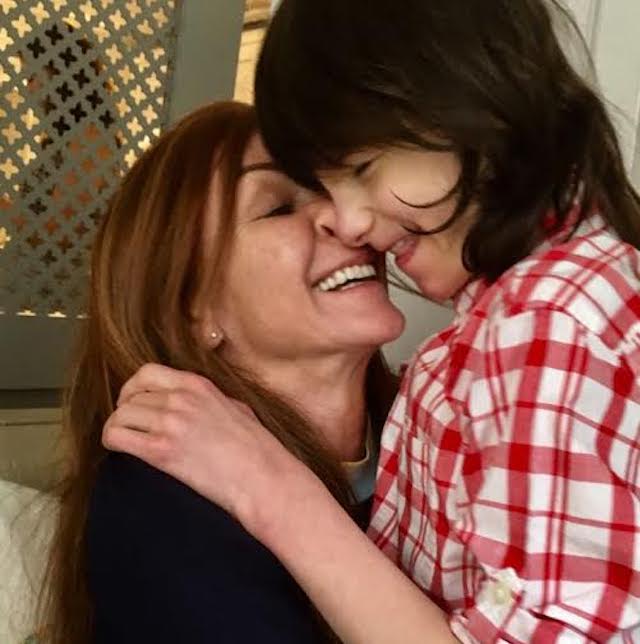I Had to Fight the British Government to Get Medical Cannabis for My Son
In June of 2018, 12-year-old Billy Caldwell arrived at Heathrow Airport on a flight from Canada, on his way back home to Northern Ireland. His mother, Charlotte, was carrying cannabis oil she had bought in Toronto – a medicine that had successfully brought Billy’s life-threatening epileptic seizures under control. Because medicinal cannabis is outlawed in the UK, customs officials seized the medicine, causing Billy’s seizures to return almost immediately.
After a battle with the Home Office, Billy was given 20 days’ worth of his anti-epileptic seizure drugs, and Home Secretary Sajid Javid told Parliament he would launch a review into medicinal cannabis, with a view to liberalising the laws surrounding it if experts conclude there are “significant medical benefits” to cannabis-based medicine.
Here, Charlotte Caldwell tells her story.
I did it to keep my son alive. If I hadn’t taken on the British government and the absurd, outdated laws around medical cannabis, then my little boy, Billy, would very likely have died.
Keeping my boy alive has been the one guiding principle of my life for the last 13 years. It is the reason I wake up in the morning. It is the reason I feel such a sense of betrayal and anger in how the government has treated us – but also why I feel such relief and joy that we might actually be making a difference.
I know our campaign to get Billy his medicine has captured headlines over the past few weeks – and I know we might even make a little bit of history by helping medicinal cannabis finally become legal again in this country – but for Billy and I, this story goes back so much further.
Billy had his first seizure at four months old. I was lying in bed, and he was next to me in his little Moses basket. At first I tried to comfort him, but then I began to get scared and took him into hospital.
The second we were in the ambulance, he went into a full-blown Grand Mal Seizure. The sight of his tiny body – just four months old – convulsing, spasming and turning bright red like a tomato is one that will stay with me for the rest of my life. The paramedics ripped his clothes off, and before I knew it they were putting lines in all over his body. I was completely terrified. I really thought he was dying.

Eventually they slammed so many medications into him that they stopped the electrical activity in the brain and the seizures did stop. I was finally allowed into the room, but Billy’s tiny, wee body was hooked up to so many machines that I could hardly even see him in the midst of all the wires.
We didn’t leave the hospital for four months. They tried all sorts of pharmaceuticals, but nothing really worked. Billy was having 100 seizures a day at some points. It was during that first huge seizure in the ambulance that Billy sustained his brain damage.
Eventually the doctors started offering to take Billy into a little side ward, and put a line of morphine into his arm so he would just go to sleep on my knee forever. They tried that with me every day, shoving these forms at me – but I wouldn’t do it. I thought, if he was going to die, then he would die at home. They gave him six months to live and said he wouldn’t see past his first birthday. Everything else in my life stopped, except taking care of him. I bathed him and massaged him – and got him through these terrible seizures that he was still having.
I also became an expert in epilepsy. I read every article and scrap of information I could find. Every room in the house was covered with downloads and printouts. I began to work out that perhaps Billy hadn’t been given the correct tests – that there might be some hope after all.
One name kept coming up in this research – Professor Douglas Nordley in Chicago. I got in touch with him and then had to fight the hospital for five months just to get Billy’s medical records to send to America. The phone rang in June and we were given an appointment in September – there was some hope at last.
That meant I had ten weeks to raise $250,000 (£189,000). This was before social media, so I got on to every single newspaper, radio and TV station, and the support was amazing. Strangers from all over donated, and we flew to Chicago.
Professor Nordley cut Billy’s medications from six down to one, adjusted his diet and managed to bring the seizures under control. One of the drugs Billy had been on was phenobarbital – and weaning him off that was like watching someone withdraw from heroin. Watching him go through that, at just one-year old, was incredibly painful – but for the first time in so long I actually felt some hope.
We stayed in Chicago for two years. Billy did intense physical therapy four hours a day, five days a week. The seizures had seriously curtailed his development and he had to learn how to crawl, how to sit, how to pick up his own toy – at first he didn’t even have the strength to lift his own head. But when we flew back to Northern Ireland two years later, Billy was walking beside me through the airport.

The Health Ministry here had promised to help continue Billy’s physio, but then reneged on that promise – so once again I had to raise the money myself. But for almost eight years Billy was seizure-free. We lived a very simple life in our little cottage, and Billy was able to learn while having a garden to wander and play in. I never thought he would achieve that sort of quality of life, so I was overjoyed.
Then, in 2016, the seizures started again. They came on just as suddenly as before. To suddenly have Billy once again going through back-to-back seizures, after how far we had come, was completely wrenching.
I immediately tried to access an urgent medical review, but I hit brick wall after brick wall. It was a six to nine-month waiting list and we couldn’t wait that long – any one of those big Grand Mal seizures could kill Billy at any time.
Over the years I had kept in touch with Professor Nordley, sending him pictures of Billy’s progress. He was now based at the Children’s Hospital in Los Angeles and just said, “Bring Billy to me,” so I had to fundraise again, but we got Billy out to LA.
It was at this point that Prof Nordley asked if we had ever considered medicinal cannabis – which I suppose might not have even really been known about ten years earlier. I didn’t even make the connection between this medicine and people smoking weed for fun. The only thing in my head was that one big seizure can kill Billy, so if this could help, of course we’ll try it.
We were referred to a specialist, and over a period of 12 weeks they tried different formulas and Billy once again became completely seizure-free. Billy is also autistic, and with the cannabis oil I noticed that he could maintain eye contact with people in a way he never did before. He is so cuddly and tactile now. He never used to come and hug me. I remember the first day Billy came running towards me with his hands outstretched for a cuddle – as a mother, that had to be the happiest moment of my life.
We flew back to Ireland, and I walked through customs and declared Billy’s medicine without a problem. I wasn’t even nervous – for me, this is just medicine. I’ve never smoked weed, I’ve never wanted to. This is just the medicine that keeps my son alive.
So for one year and one month we were really happy. Billy was running about the garden and making progress – and, like a proud mum, I was putting these photos and videos up on social media, to show all the people who had supported Billy over the years that they had really achieved something.
Then I started getting messages from other mothers and fathers throughout the country whose children had the same condition, and who were watching Billy in amazement. So Billy, myself and some volunteers did a 3,000 kilometre road trip all round Ireland and the United Kingdom, talking to families and politicians about what could be achieved.
Then came the shock. Completely out of the blue, I received an email from Billy’s GP saying he was no longer allowed by the Home Office to write Billy’s prescription for medical cannabis. I went into a panic. We had three weeks of medication left, so I immediately began looking at where to fly to keep the supply going. I couldn’t let Billy slip back into his seizures.

That’s when a friend put me in touch with Steve Moore from the organisation VolteFace. Steve found out about a manufacturer in Toronto named Tilray – which made sense, as that is a far shorter flight than LA, so it’s easier for Billy.
I will never buy anything for Billy off the black market. It has to be medically approved and pharmaceutical quality. It originally took us weeks to find the right formula for Billy, and a product with too much THC might even make the seizures worse. So we flew to Toronto, saw two separate specialists, then flew back with the medicine to London.
I walked through Heathrow once again with the medicine in my bag. I went up to these two big customs officers and handed over all the files, carefully laid out with the medical data and prescriptions. They asked me to wait, then came back about 45-minutes later and said they had to confiscate the medicine. The officer actually started crying – this big guy in his uniform had tears streaming down his face. He said, “I’m a father myself, I wish I didn’t have to do this. I don’t want to do it – but I have to. If my child was in the same position I’d be doing the same thing.”
Of course, I started crying. The cruelty of taking away a medication that my child needs was too much. They handed me a letter from the MP, Nick Hurd, quoting these outdated policies, and I just felt so sad and so angry. I knew the consequences for Billy would be severe pain and maybe death. This was simply the bureaucratic torture of a child.
I went through and gave a press conference, and in the middle of that a call came through that Nick Hurd wanted to see me. So I went into this meeting with Steve – facing this group of men in suits – and I just begged them to give the medicine back. I offered to come to the Home Office with Billy every day so they could administer it, even just to wean him off – because stopping cold was so dangerous. They just refused.
Hurd tried to palm me off by asking me to apply to take part in another programme to supply CBD oil – but CBD oil is not what Billy needs. Did he actually believe I wouldn’t know the difference? They couldn’t tell how long that programme would take, or what it would cost – I could see them all just squirming in front of me. But I knew Billy didn’t have four months for a review; his life was in danger right now.
At this point, Billy had missed two doses of his medicine. Getting into the early hours of that morning, he had his first seizure. Within 48 hours he was into full blown back-to-back seizures, and we couldn’t stop them. The paramedics, nurses and doctors at Chelsea and Westminster Hospital were all appalled at Nick Hurd’s decision to withdraw this medicine – and my heart was exploding in despair and rage, because this was child abuse at the highest level.
But the whole time I was sitting in that hospital with Billy, I knew Steve Moore was negotiating 24 hours a day with the Home Office. Our MP in Northern Ireland, Órfhlaith Begley, was also brilliant – she was on the phone to us and the Home Office the whole time.

I think Steve actually came to the agreement with the Home Office at 2AM, talking on his mobile outside a nightclub in west London. When I got the news at the hospital my heart completely leapt. First off, my boy was going to get his medicine – but I also knew that we may have cleared the way for other suffering families. In ten days, Billy had changed a 50-year-old outdated law that had brought so much misery.
A few days ago, the Daily Mail tried to run a hit piece on us, saying that I was being manipulated by some sort of secret organisation. I read that and just rolled my eyes – it’s pathetic.
I’ve been completely open about how people like Steve Moore, Paul Birch and all the others at Families 4 Access and VolteFace have helped me. They saw a little boy and his mum in a life and death situation, and stepped in to help. Billy and I will never stop thanking them for that for the rest of our lives. For the Daily Mail to employ four journalists, over several weeks, to try to cast insinuations about that relationship is extraordinarily low and nasty.
But honestly, after everything we’ve been through, that is all just so irrelevant. I’ve been focused for 13 years on keeping my boy alive – and now I know we can go back to our little place in Tyrone and Billy can be safe and happy once again, playing in his garden.
I also do take some happiness in knowing we may have helped change the law for other families who might be suffering. I hope Billy and my story might offer some of these families some comfort and hope, knowing that even when you feel there is nothing left, things can still turn around. If there’s one thing this whole 13-year story has taught me, it’s that, when you’re going through hell, just keep going!
JS Rafaeli is the author of Drug Wars.
This article originally appeared on VICE UK.